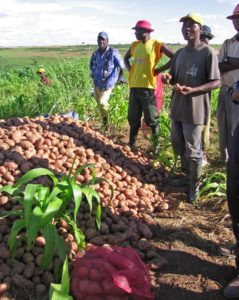To feed the growing world population, agricultural productivity needs to increase without compromising conservation of the world’s natural resources. Recognizing that research and innovation are essential to achieving a balance between productivity and sustainability, the Food and Agriculture Organization of the United Nations (FAO) has collaborated with IFPRI to conduct research and develop solutions such as improving agricultural extension, promoting sustainable biofuel production, and strengthening agricultural employment.
Agricultural extension systems are important channels for disseminating new information, practices, and technologies that promote higher yields and efficient use of resources. Initially, the public agricultural extension system in India was plagued with inefficiencies that impeded new technologies and innovations from reaching farmers. In response, the Government of India enacted reforms, including the creation of the Agricultural Technology Management Agency (ATMA). The challenges persisted even when the reforms were scaled up. So in the late 2000s, the government worked closely with FAO and IFPRI’s South Asia Office to conduct the first critical review of the agricultural extension reforms in India. The study found that the challenges persisted because ATMA was scaled up too quickly without careful analysis or consideration of the different capacity, leadership, ownership, and resources available in the diverse Indian states. The joint FAO-IFPRI review contributed to the reform of the system of extension services aimed at enhancing agricultural productivity while making agricultural systems sustainable in India.
In the late 2000s, the rapid development of biofuels incited debates around their sustainability and negative impact on food security. To support developing countries in forging sound biofuel policies, FAO developed the Bioenergy and Food Security (BEFS) Approach—a multidisciplinary set of tools and guidance to support countries throughout the process of bioenergy policy development and implementation. In 2008, FAO called on IFPRI to review the BEFS Rapid Appraisal Tool. Refinements of this tool improved its capacity for identifying the potential for sustainable biofuel production and associated opportunities, risks, and trade-offs in developing countries. In addition, FAO and IFPRI examined Tanzania’s biofuel development potential. The resulting report, Bioenergy and Food Security: The BEFS Analysis of Tanzania, showed that through use of specific crops, biofuel production can lead to increased gross domestic product, new employment opportunities, and higher incomes for the country’s small-scale farmers. The Government of Tanzania, in turn, pursued sustainable biofuel development, creating an inter-ministerial National Biofuel Taskforce in the late 2000s to write the National Biofuel Policy. At the final BEFS consultation in Dar es Salaam in 2012, the Ministry of Energy and Minerals acknowledged that the government relied on and incorporated the joint BEFS analysis in discussing the country’s energy and food security policies.
Agricultural productivity often cannot increase if one of its essential inputs—labor—is neglected. In 2008, FAO asked IFPRI to conduct a research study, supporting the development of FAO’s Decent Rural Employment strategy. IFPRI recommended four pillars that formed the basis of the strategy: short-term response to shocks (safety nets), efficient allocation of available rural labor resources, human capital development, and net job creation. Shortly after, FAO decided to implement the strategy, which continues to guide FAO’s policies, programs, and work in 62 countries.
For more information on IFPRI's work in partnership with FAO, please go to this brochure.



